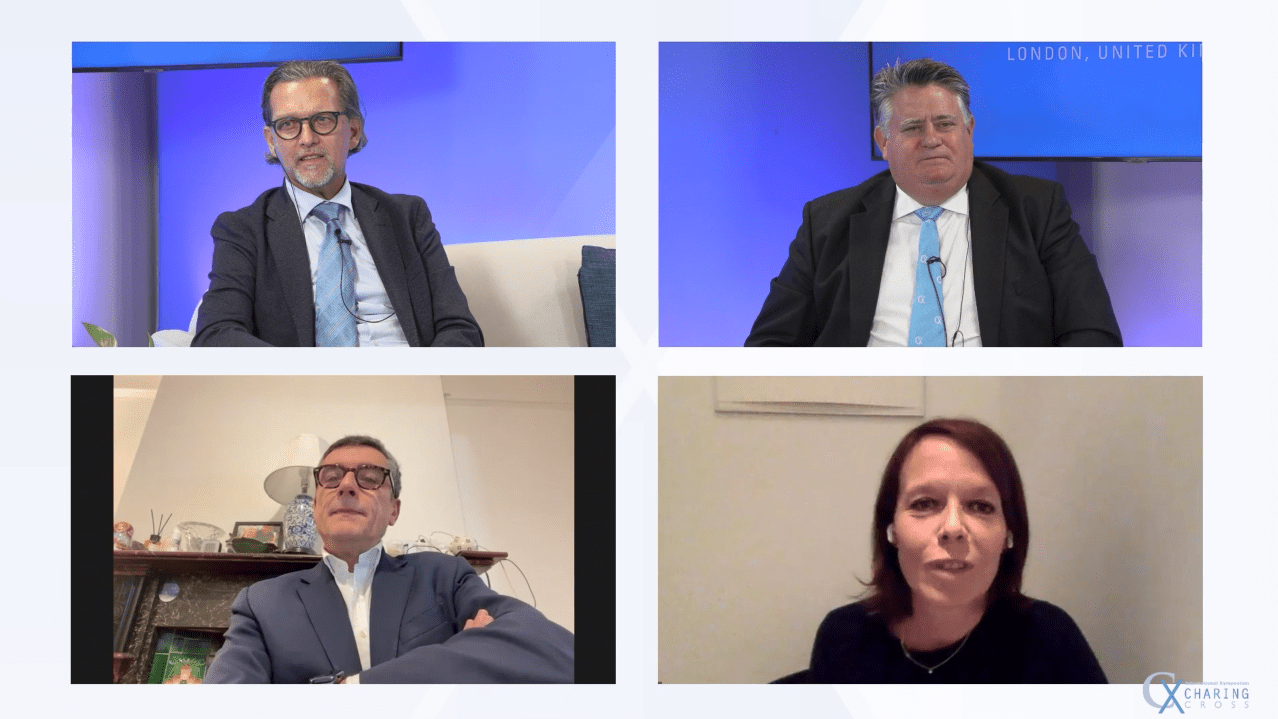New technologies and “special cases” underpin carotid and acute stroke programme

With a renewed focus on challenging cases, novel technologies and, overall, the most pressing issues in carotid treatments and acute stroke care, the 2024 Charing Cross (CX) Symposium (23–25 April, London, United Kingdom) intends to maximise audience participation throughout its Acute Stroke, Carotid and Neurointervention Controversies programme.
As part of a recent meeting previewing the CX 2024 programme—broadcast live from the CX Studio on Thursday 26 October—session moderator and CX co-chair Dittmar Böckler (University of Heidelberg, Germany) was asked whether carotid endarterectomy (CEA) remains the gold standard in treating carotid artery stenosis, as it has been for several decades.
“Based on randomised trials, registries and guideline recommendations, CEA definitively remains the gold standard, but we need different options for individualised patient care as well,” he said. “Best medical treatment, and compliance to it, is very important, and we also need complementary carotid stenting in certain indications. The challenge in stroke prevention and treatment is when to use which modality.”
Following this, CX Executive Board member Barbara Rantner (Ludwig Maximilian University of Munich, Germany), who helped curate the upcoming Acute Stroke, Carotid and Neurointervention Controversies programme, provided a preview of what delegates can expect from this session.
“There are a lot of controversies [on the programme], and this is a key element of the acute stroke session,” she said. “We have tried to address critical issues; not only in the carotid but also in the vertebral basilar circulation. This year, we are focusing a little bit more on symptomatic stenoses and we will discuss these issues with experts from all over the world.”
Teasing out some of the programme elements she feels will be especially interesting, Rantner highlighted one debate on whether or not CEA is still the standard of care over best medical treatment—even in patients with symptomatic internal carotid artery (ICA) stenosis. She also drew attention to a second debate examining the optimal treatment strategy—CEA or carotid artery stenting (CAS)—in tandem lesions, where “intracranial thrombectomy is necessary, and the underlying extracranial carotid artery needs to be treated” as well.
Domenci Valenti (King’s College Hospital, London, United Kingdom), whose recent addition to the Acute Stroke, Carotid and Neurointervention section of the CX Executive Board is sure to bring a wealth of fresh ideas to the symposium programme, then picked out the introduction of a ‘Carousel’ whereby physicians will present “very difficult cases for which there is not yet a standardised treatment defined by guidelines” as a potential highlight.
“These are special cases where we do not necessarily know what to do,” he added. “We want to show what we did, and what went right and what went wrong, because this will stimulate the audience to contribute actively during the session.”
Rantner and Valenti are among those delivering Carousel cases throughout the programme, with other prominent neurointerventional physicians including Levansri Makalanda (Barts Health NHS Trust, London, United Kingdom) set to present their experiences as well.
“I am very much looking forward to the Carousel of case presentations,” Böckler commented. “This is going to really encourage people to stand up, go to the microphone and participate in the discussion—and I think Professor [Roger] Greenhalgh would have loved to have participated in this session!”
In another example of the CX 2024 programme bringing forth new ideas and examining the latest developments in acute stroke care, a number of presentations will cover transcarotid artery revascularisation (TCAR)—a relatively recent addition to the armamentarium of carotid artery stenosis treatments that has been widely adopted in the United States, but is currently unavailable in Europe.
During the livestream, Valenti described this as an alternative method to more traditional CEA and transfemoral CAS approaches that is “emerging very fast” and seems to be “very popular” with US vascular surgeons, as it creates the possibility of treating carotid disease patients via a hybrid procedure. Michael Stoner (University of Rochester, United States) is among those set to present on TCAR at CX 2024.
The addition of another new name to the CX programme committee, Kyriakos Lobotesis (Imperial College London, United Kingdom), looks set to expand discussions at next year’s meeting even further, into the wider realm of neurointervenional surgery. During the…
Read More: New technologies and “special cases” underpin carotid and acute stroke programme

